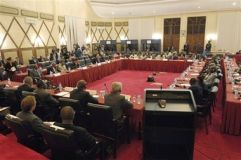Success uncertain for new Darfur peace talks
September 12, 2007 (KHARTOUM) — The United Nations and many African countries think the time is ripe to push Darfur’s rebel groups to reach a peace deal with Sudan’s government, and end four years of bloody conflict once and for all.
 Both sides have reached a military stalemate, and months of intense international pressure have finally forced Khartoum to allow a new 26,000-strong joint U.N. and African Union peacekeeping force into Darfur.
Both sides have reached a military stalemate, and months of intense international pressure have finally forced Khartoum to allow a new 26,000-strong joint U.N. and African Union peacekeeping force into Darfur.
U.N. chief Ban Ki-moon says new peace talks, set to start Oct. 27 in Libya, must be “a final settlement of this issue” Darfur’s bloodletting has killed more than 200,000 people and uprooted 2.5 million Darfurians from their homes.
But Darfur has a history of peace talks _ their sheer numbers a testimony to their lack of success. And there are many obstacles in the way of ensuring a new set will bring lasting peace.
Since fighting began in 2003 between ethnic African rebels and the Arab-dominated Sudanese government, there have been over half a dozen cease-fires or peace deals of various formats _ all quickly breached by both sides.
The latest violation came just Monday, when government air force and troops raided a rebel-controlled town, killing at least a dozen people and ignoring a United Nations ban on military flights over Darfur.
Khartoum has claimed that operations such a Monday’s are provoked by attacks by rebel groups which rejected the latest peace deal, signed in 2006 in Abuja, Nigeria, by the Sudanese government and a branch of the rebel Sudan Liberation Army.
The holdout factions are precisely the ones the U.N. and the African Union want to bring to the new negotiations.
Abdellaziz Ushar, a rebel commander from the Justice Equality Movement, one of the rebel holdouts, said Monday’s attack proved the “government is not willing to hold real peace talks.”
Speaking from the raided town of Haskanita, Ushar said a senior U.N. mediator visited his camp to talk about the new peace negotiations just 48 hours before government gunships dropped bombs on him.
The Sudanese army denied the offensive.
The JEM rebels said the attack “clearly targeted” their leader, Khalil Ibrahim, who said he would attend the Libya talks with the intention of signing a new peace deal. However, Ibrahim also said his group would continue to fight during the negotiations because cease-fires during previous talks had proved ineffective.
Abdelwahid al-Nur, another main holdout rebel chief, has vowed not to attend the talks until the U.N.-AU peacekeepers are fully deployed in Darfur because, he says, the government can’t be trusted otherwise.
This could be a big stumbling point, since al-Nur is viewed as having the largest following among Darfur refugees and the U.N. wants the civilians to be heard at the talks too. There are also fears that the Paris-based al-Nur may be unable to rein in bickering field commanders from his SLA faction.
“I’d strongly advise Abdelwahid to join, or he’ll loose his last chance to have an input in the negotiations,” said Rodolphe Adada, head of the new U.N.-AU peacekeeping mission.
The joint force, approved by the Security Council on July 31, will likely start deploying in October, just as the Libya talks begin.
Fragmentation of rebel groups has been the Darfur movements’ main weakness, and Ibrahim of JEM warned he would pull out of the Libya talks if the half-dozen factions linked to al-Nur fail to speak with one voice.
The rival SLA movement of Minni Minawi, the only rebel chief who signed the Abuja deal, welcomed the new talks. However, the U.N. says Minawi’s fighters have increasingly clashed with other Darfur factions.
As host, Libya could be key to getting the disparate groups together. It is believed to hold leverage over several Darfur rebel leaders and has hosted them in the past. Long-ostracized Tripoli is also eager to project an image of regional peacemaker.
Still, the main question remains what to negotiate on.
Rebels say they took up arms against Khartoum to end decades of unfair treatment and government discrimination against ethnic Africans. None have demanded Darfur’s independence, but have called for stronger regional role and better financial compensations for war victims.
Sudan’s Minister of State for foreign affairs, Al Sammani Al Wasila, said Monday that Khartoum was willing to negotiate those points.
Another key rebel demand is that Khartoum disarm the janjaweed militia, the government-armed fighters from Darfur Arab nomad tribes blamed for most of the atrocities against civilians.
Most of these issues were already central to the Abuja deal and a senior mediator warned the rebels against expecting more Khartoum concessions. The mediator, who asked to remain anonymous because of the sensitivity of the talks, anticipated the new negotiations will focus on enforcing the existing Abuja deal.
Still, by reducing the violence, the U.N.-AU peacekeepers could help reach a political settlement, said Adada, the U.N.-AU mission chief.
“The most difficult problem will be the good faith of all parties in Darfur,” Adada said.
(AP)
